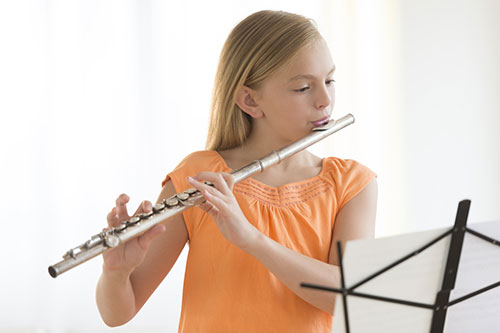 If you’re learning an instrument, there’s no question that you will benefit from private lessons with a good teacher. An experienced flutist knows far more about the flute than you do and can offer you professional tips, exclusive information, personal insight, new flute music, performance experiences, and more. Even if you’re decent at self-teaching, your flute teacher can save you from building bad habits and help you to progress immensely faster than you would on your own. Here are 15 reasons why you need private flute lessons.
If you’re learning an instrument, there’s no question that you will benefit from private lessons with a good teacher. An experienced flutist knows far more about the flute than you do and can offer you professional tips, exclusive information, personal insight, new flute music, performance experiences, and more. Even if you’re decent at self-teaching, your flute teacher can save you from building bad habits and help you to progress immensely faster than you would on your own. Here are 15 reasons why you need private flute lessons.
15 Reasons Why You Need Private Flute Lessons
1) Flute Lessons are a Great Extracurricular Activity: Flute lessons are lots of fun, they teach you a creative skill, they challenge your mind and body, and they aren’t limited to seasons. Flute lessons are also far more affordable than many extracurricular activities.
2) Share Your Passion For Flute: No one goes into teaching a musical instrument without feeling passionate about it. If you’re passionate about flute, you and your flute teacher will share that passion and enjoy the adventure of making beautiful flute music. There’s no buzzkill like finding out that your friends don’t care about what you’re interested in, but if you have a flute teacher, you have someone who will share your love of flute.
3) Learn Flutey Things: Obviously, flute lessons will teach you flutey things! By “flutey things” I mean exercises, skills, tips, you name it, that are specific to the flute. Any band or orchestra teacher can offer valuable insight for improving your skills as a musician, but for flute-specific advice, you want private flute lessons. A flute teacher can help you improve your tone, fix fingerings, learn technique, and learn specific tools, exercises, and tricks to make you a better flute player. For example, did you know that it takes more air to play the flute than any other instrument except perhaps the tuba? A private flute teacher will teach you better breath control, which helps you develop stronger lungs so that you can hold notes for longer, play for longer without stopping to breathe, support your sound, and stay in tune.
4) They Know The Instrument: If you’re self-teaching and your flute stops working, or you have troubles with it, who do you go to? A flute teacher could test out your flute for you and determine whether it needs repair or replacement. If it’s broken and they can’t fix it themselves, they can get you to someone who can.
5) Get Valuable Flute Information: A professional flute teacher knows valuable information about the best flute brands, where to get a good flute, what to look for, how to get your flute repaired, how to care for it, where to get great flute music*, performance opportunities, etc. It’s definitely worth it to tap into this knowledge.
*If you’re looking to learn a specific song on the flute, contact me for a custom arrangement.
6) Accountability is an Excellent Motivator: When you don’t have anyone to answer to, do you actually do the work? How many of us would skip “doing the work” to solve a math problem if we didn’t have to show it on the paper? I remember well the occasional apprehension of walking into my piano lessons years ago, knowing I hadn’t practiced and that my tiny-yet-terrifying Korean teacher would know it immediately. Teachers always know whether you’ve done the work or not! And this is a GOOD thing, because it helps you be motivated to practice! Practice is what leads to progress. Knowing that every week you have a mini “performance” for your teacher is great motivation to be sure you’re doing your part.
True story: Some kids in my high school band almost never played their instruments, and during performances, they would only pretend to play. Regular solo performances at weekly music lessons would eliminate any desire to fake playing with your ensemble.
7) One-on-one Attention vs Blending Into the Ensemble: If you’re learning flute, you’re probably in a band or orchestra. I encourage all my music students to join an ensemble because it’s a rewarding experience that teaches you things you simply can’t learn in one-on-one lessons. But the tradeoff is that in a large ensemble, you don’t get one-on-one attention. In private lessons, you get 100% of the teacher’s focus to help you with your fingering, note-reading, tone, breathing, and a million other things.
8) Performance Experience: If you’re not in an ensemble and you want to learn flute anyway, chances are you don’t really have any places to perform. A flute teacher is someone you can perform for or with on a regular basis, and most teachers hold recitals at which you could have a chance to perform. They should also be able to direct you to community or special ensemble groups that you could join.
9) Understand Your Music and Learn Music Theory: Many people who stop making music only quit because they didn’t understand it. Most ensemble conductors don’t teach a lot of music theory because 1) they assume you already know it, 2) they don’t know what you may or may not know, and 3) they simply don’t have the time or means to teach it all with all the music you’re practicing. In private flute lessons, you’ll learn music theory so that you can understand the music you’re trying to play.
10) They Know What It’s Like: Professional flute instructors know what it’s like to be in band and/or orchestra, which means we can offer insight that may help you! I’ve spent a lot of years in various ensemble groups, and that experience allows me to help my music students navigate the good and the bad.
11) Make Good Flute Connections: Connecting with a flute teacher is your first great flute connection! With your teacher’s help, you can learn all kinds of fun, high-quality flute music. You can also use them as a network to help you meet other talented flute players and get involved in performing groups.
12) Take Advantage of An Extra Set of (Professionally Trained) Ears: An extra set of ears is always helpful because they hear the things you missed. An extra set of professionally trained ears on the head of a flute teacher will catch all kinds of things you never could. Your flute teacher will draw your attention to those things and help you improve where you didn’t even know you could.
13) Avoid Learning Bad Habits: Inevitably, self-taught musicians develop one or more bad habits and don’t find out until they’re taught by a good teacher. Bad habits have to be unlearned before the correct habits can be relearned, which seriously hampers your forward progress. Sometimes bad habits completely prevent any progress until they’re unlearned, and the whole “unlearning” process can mean a lot of extra time and frustration for you. With a good teacher, you learn the correct habits right from the start, and you won’t have to unlearn anything later.
14) Accelerate Your Progress: With regular one-on-one lessons, your progress will be much faster than it would be if you were self-teaching. The faster you learn, the better you’ll get and the sooner you’ll be able to perform and make even more beautiful music.
15) Flute Lessons Make Playing Flute Fun, Easy, and Rewarding: Private flute lessons can offer you the most rewarding and enjoyable experience with learning flute! You’ll find out just how easy it is to be good at it, and you’ll quickly develop an even greater passion for making music with this beautiful instrument.


